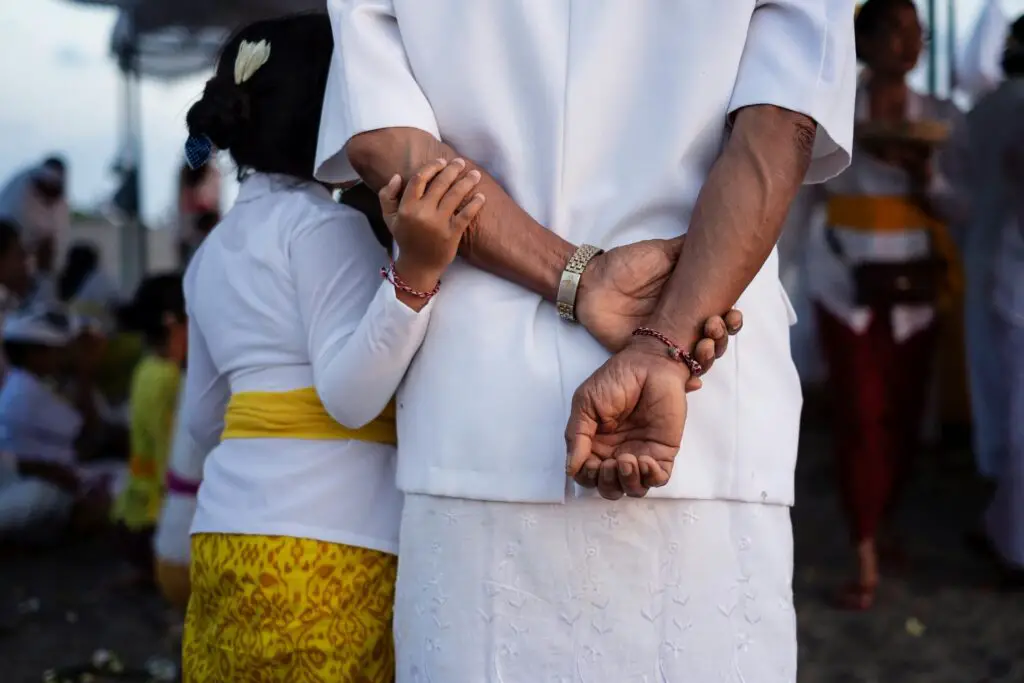1. Always Say “Yes, Ma’am” and “No, Sir”

Manners weren’t optional in a religious household. You were expected to address every adult with “ma’am” or “sir,” whether it was your parents, teachers, or even a stranger at the grocery store. If you slipped up and just said “yeah” or “no,” you’d probably get a sharp look or a reminder to “show some respect.” It wasn’t just about sounding polite—it was seen as a reflection of your upbringing and your values. Some families even extended this to saying “Mr.” or “Miss” before someone’s first name, especially in church settings shares Family Christian. It felt formal, but that was the point—respect wasn’t just implied; it was spoken out loud. And if you ever called an adult by their first name without a title? You’d better believe there was a lecture coming your way.
This rule didn’t just apply at home, either. If you went to a friend’s house and didn’t use the proper titles, their parents would sometimes correct you too. It created a sense of discipline and reinforced the idea that children weren’t on the same level as adults. Of course, this sometimes led to awkward moments when you encountered more relaxed households where parents didn’t expect the same level of formality. But in a religious home, respect was drilled into your vocabulary from the start says Pray.com.
2. Never Interrupt an Adult’s Conversation

If grown-ups were talking, you waited your turn—no exceptions. Jumping into a conversation uninvited was seen as the height of rudeness. You were expected to stand quietly and wait for a natural pause before saying “excuse me.” Even then, you had to be sure your interruption was important enough to justify it. Asking for a snack? Not urgent. Bleeding from the knee? That might warrant a break in the conversation adds Reddit.
Patience was part of the lesson, but so was understanding that adults’ words carried weight. It reinforced the idea that kids weren’t supposed to demand attention or assume their voices carried the same authority. If you did interrupt, you might get a quick “we’re talking” or, worse, a long stare that told you to back off immediately. Some parents even made kids start over and ask permission to speak. It may have felt strict, but it taught a deep-rooted lesson in self-control shares Answered Faith.
3. Church Clothes Were Non-Negotiable

Sundays (or Saturdays, depending on your denomination) meant dressing up, no matter how uncomfortable or inconvenient it was. Boys wore collared shirts and sometimes ties, while girls had to put on dresses or skirts that covered their knees. Jeans? Absolutely not. It didn’t matter how casual the church itself was—your family believed that dressing well was a sign of respect for God. If you complained about itchy tights or stiff shoes, you’d probably hear, “If you can dress up for a wedding, you can dress up for the Lord.”
This rule extended to other religious events too, from Bible studies to weddings and funerals. You were expected to put in the effort, even if no one else did. And if you showed up in something deemed inappropriate? You’d either get a last-minute wardrobe change or a whispered scolding about modesty. Even when you got older and had the freedom to dress yourself, that little voice in your head still made you hesitate before throwing on casual clothes for church.
4. Elders Were Always Right (Even When They Weren’t)

If an elder said something, you didn’t argue. Disagreeing with an adult was seen as a sign of disrespect, even if they were clearly wrong. The idea was that experience and wisdom came with age, and kids didn’t have the right to question that. If you ever dared to say, “That’s not true,” you might get a stern reminder that “backtalk” wasn’t tolerated. In some households, even asking “why?” could be taken as a challenge.
This rule could be frustrating, especially when you knew you had a valid point. But it taught you to listen first and speak later, a lesson that followed you into adulthood. It also meant you had to develop creative ways to express disagreement without outright saying someone was wrong. Learning to phrase things as questions instead of statements became a survival skill. And even then, there was always a chance you’d get the classic response: “Because I said so.”
5. Always Pray Before Meals

No one took a bite until the prayer was said. Whether you were at home, in a restaurant, or at someone else’s house, you paused to give thanks. If you ever forgot and started eating too soon, you’d either get a look or be asked to put your fork down and wait. In some families, prayers were short and sweet, but others had long, detailed blessings that felt like an extra course before the meal. If a guest was over, they were expected to bow their head too, even if they weren’t religious.
This rule wasn’t just about food—it was about gratitude. Even on rushed mornings or during casual lunches, the ritual remained. If you went to a public school, you might have gotten used to whispering a quick “thank you” before lunch. And if you ever had friends over who weren’t used to praying, you had to explain the rule beforehand to avoid any awkward moments.
6. Respect the Sabbath (No Matter What)

Sunday wasn’t just another day—it was sacred. That meant no sleeping in, no skipping church, and sometimes no unnecessary work or fun activities. Some families avoided shopping, eating out, or even watching TV because the day was supposed to be set aside for rest and worship. If you ever asked to go to a birthday party or a sports game on a Sunday morning, you already knew the answer would be no. The day belonged to God, and everything else had to wait.
This could be tough as a kid, especially when your non-religious friends had full weekends of activities. But in a religious household, keeping the Sabbath holy wasn’t up for debate. Some families even had traditions like a special Sunday lunch or a full afternoon of Bible reading. And if you ever groaned about it? You’d probably get a reminder that God gave you six other days to do whatever you wanted.
7. You Had to Watch Your Language (Even the Mild Words)

Swearing was completely off-limits, but it didn’t stop there. Even words like “gosh,” “heck,” and “darn” were frowned upon because they were seen as too close to the real thing. If you slipped up, you might get a lecture about how your words reflected your heart. In some households, even saying “Oh my God” was considered disrespectful—you had to say “Oh my gosh” instead.
This rule sometimes made school tricky, especially when other kids used language more freely. If you ever repeated something you heard on TV and got caught, you’d probably have to explain where you learned it. Some parents even washed kids’ mouths out with soap as punishment. Over time, you learned to self-censor and avoid anything that sounded even remotely inappropriate.
8. Respect Your Parents—No Talking Back

Disagreeing with your parents wasn’t just frowned upon—it was considered outright disobedience. If they told you to do something, the only acceptable response was “yes” or “yes, ma’am/sir.” Rolling your eyes or muttering under your breath? That was asking for trouble. Even if you felt like they were being unfair, arguing was never an option. Some parents even quoted the Bible, reminding you that “honor your father and mother” wasn’t just a suggestion—it was a commandment.
Of course, this could be frustrating, especially when you just wanted to explain your side of things. But in a religious household, respect wasn’t about fairness—it was about obedience. Some kids learned to bottle up their feelings, while others found roundabout ways to express disagreement without crossing the line. And if you ever got caught mumbling something after you walked away? You might get called back and told to “say it again” in a tone that made you immediately regret it.
9. Always Offer Your Seat to an Adult

If an adult walked into the room and there weren’t enough seats, you were expected to stand—no hesitation. This rule applied everywhere, from church to family gatherings to waiting rooms. It didn’t matter if you were exhausted or if the adult was perfectly capable of standing. Respect meant putting others’ comfort ahead of your own. If you had to be reminded to give up your seat, you might get a disappointed look or a quiet scolding later.
This wasn’t just about politeness—it was about knowing your place in the hierarchy of respect. Elders were to be honored, and small sacrifices like this were seen as a way to show it. Even as you got older, the habit stuck. If you were on a crowded bus or in a packed room, you felt an instinctive nudge to stand up if someone older needed a place to sit. And if you ever hesitated, you could practically hear your parents’ voices in your head telling you to move.
10. No Phones at the Dinner Table

Mealtime was sacred, and that meant no distractions—especially not from technology. In some religious households, this rule applied even before cell phones existed. Once phones became common, the expectation remained the same: no texting, no checking notifications, and definitely no scrolling while someone was talking. If you so much as glanced at your screen, you might get a pointed, “Is that more important than your family?”
The dinner table was supposed to be a time for connection, gratitude, and sometimes even a Bible discussion. It wasn’t just about eating—it was about being present. Some families made a habit of collecting all phones before dinner to remove the temptation entirely. And if you argued that you were just checking the time? You’d probably get a reminder that clocks exist for a reason.
11. Speak Kindly About Others (Even When It’s Hard)

Gossiping was a big no-no. You were constantly reminded that your words had power, and speaking badly about others—whether it was a classmate, a family member, or even a celebrity—wasn’t acceptable. If you slipped up and said something unkind, you might be reminded that “if you don’t have anything nice to say, don’t say anything at all.” Some parents took it even further, asking, “Would you say that if Jesus were in the room?” That question alone was enough to make you think twice.
Of course, this didn’t mean you never had negative thoughts about people—it just meant you learned to keep them to yourself. If you struggled with someone, you were encouraged to pray for them instead of talking about them. This rule made you hyper-aware of your words, which could be both a blessing and a challenge. Even as an adult, you might catch yourself biting your tongue when you’re tempted to vent.
12. The Bible Came First—End of Discussion

If something was in the Bible, that was the final word on the matter. There was no debating, no bending the rules, and no arguing about context. If you questioned a rule, you might get told, “Because that’s what the Bible says.” This applied to everything from moral decisions to daily habits. If you wanted to do something that went against biblical teachings, the answer was simply no.
This mindset shaped every aspect of life, from the way you dressed to the way you spoke to the way you treated others. While some kids struggled with feeling like they couldn’t ask questions, others found comfort in the certainty of it all. Even as an adult, you might hear certain Bible verses ringing in your ears when faced with a tough choice. And whether you still live by those rules or not, there’s no denying that they left a lasting impression.
